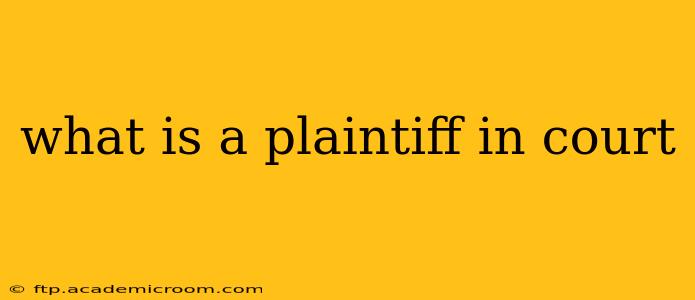In the world of law, understanding the different roles is crucial to comprehending legal proceedings. One of the most fundamental roles is that of the plaintiff. Simply put, the plaintiff is the individual or entity who initiates a lawsuit. They are the person or organization who believes they have been wronged and seeks legal redress through the court system. This article will delve deeper into the role of a plaintiff, answering common questions and providing a comprehensive understanding of their position in a legal case.
Who is Considered a Plaintiff?
A plaintiff can be a wide range of individuals or entities, including:
- Individuals: A single person bringing a claim against another individual or organization. This could be for a personal injury, breach of contract, or defamation, for instance.
- Corporations: Businesses can sue other businesses or individuals for various reasons, such as contract disputes or intellectual property infringement.
- Government Entities: Governments at local, state, and federal levels can act as plaintiffs in lawsuits to protect public interests or enforce regulations.
- Non-profit Organizations: These entities can also bring lawsuits to protect their missions or the interests of their beneficiaries.
What Does a Plaintiff Do?
The plaintiff initiates the legal process by filing a complaint (also known as a petition or statement of claim) with the court. This document outlines the facts of the case, the legal claims being made, and the relief sought from the court. The plaintiff has the burden of proof to demonstrate their claims are valid. This typically involves gathering evidence, such as documents, witness testimonies, and expert opinions. The plaintiff's legal team will play a significant role in preparing and presenting this evidence in court.
What Relief Can a Plaintiff Seek?
The type of relief a plaintiff seeks varies depending on the nature of the case. Common forms of relief include:
- Monetary Damages: This is the most common form of relief, representing financial compensation for losses suffered. This can include medical bills, lost wages, pain and suffering, and property damage.
- Injunctive Relief: This involves a court order compelling the defendant to do something (mandatory injunction) or refrain from doing something (prohibitory injunction). This might be used in cases involving intellectual property or environmental disputes.
- Specific Performance: In certain contract cases, a plaintiff might seek a court order compelling the defendant to fulfill their contractual obligations.
- Declaratory Judgment: This type of relief clarifies the legal rights and responsibilities of the parties involved in a dispute.
What Happens if the Plaintiff Loses?
If the plaintiff fails to prove their case, the court may rule in favor of the defendant. This means the plaintiff's claim will be dismissed, and they may be ordered to pay the defendant's court costs. The plaintiff can, in some jurisdictions and under certain circumstances, appeal the court's decision to a higher court.
How is a Plaintiff Different from a Defendant?
The key difference lies in who initiates the lawsuit. The plaintiff initiates the action, while the defendant is the party being sued. The defendant is required to respond to the plaintiff's complaint and present their defense.
What are the Responsibilities of a Plaintiff?
The plaintiff's responsibilities include:
- Filing the initial complaint outlining their claims.
- Gathering and presenting evidence to support their claims.
- Cooperating with their legal team throughout the litigation process.
- Attending court hearings and proceedings.
- Adhering to court rules and deadlines.
Understanding the role of the plaintiff is crucial to comprehending the legal system. Their actions initiate the legal process, and their success hinges on their ability to prove their case convincingly in court. While this overview provides a general understanding, consulting with a legal professional is always recommended for specific legal advice.
